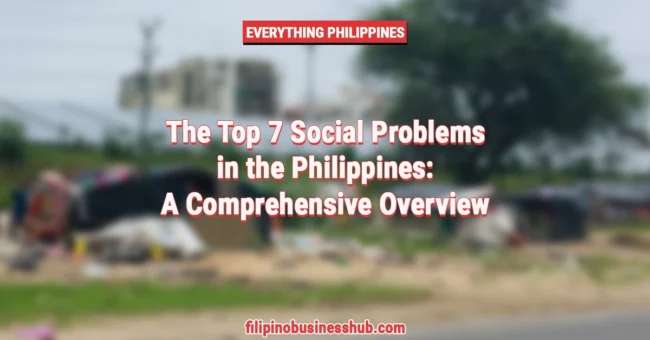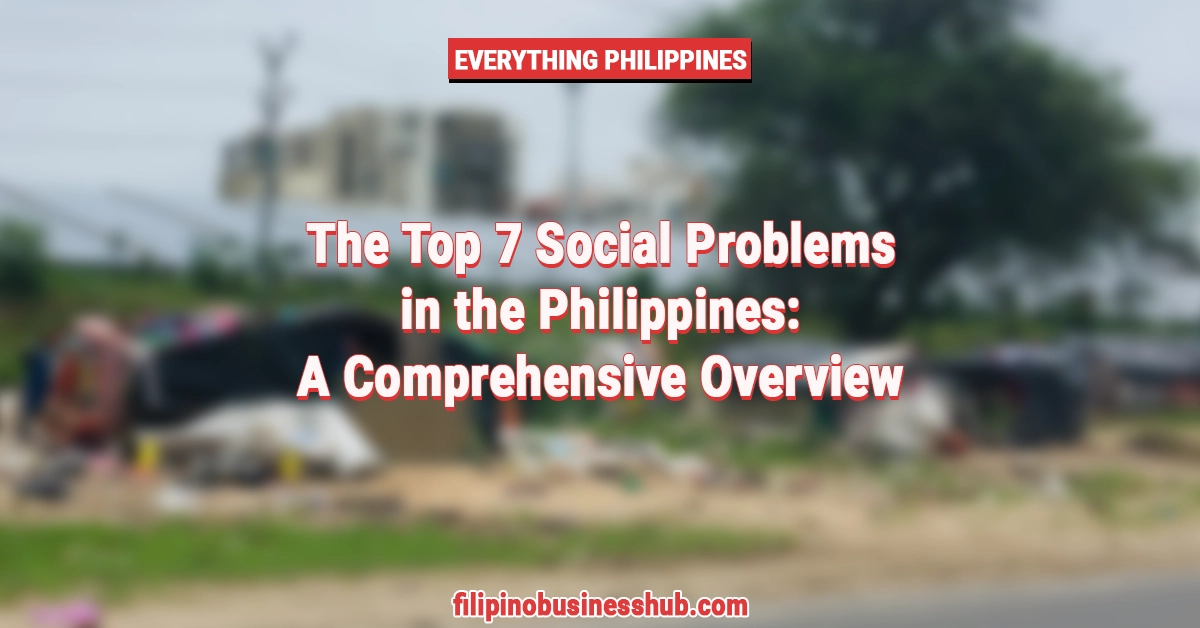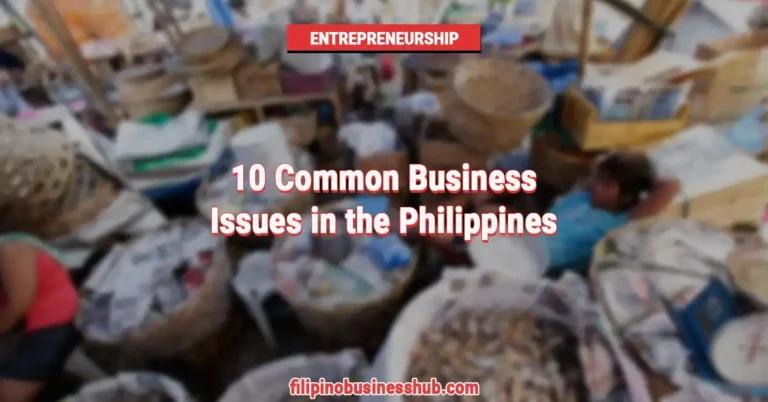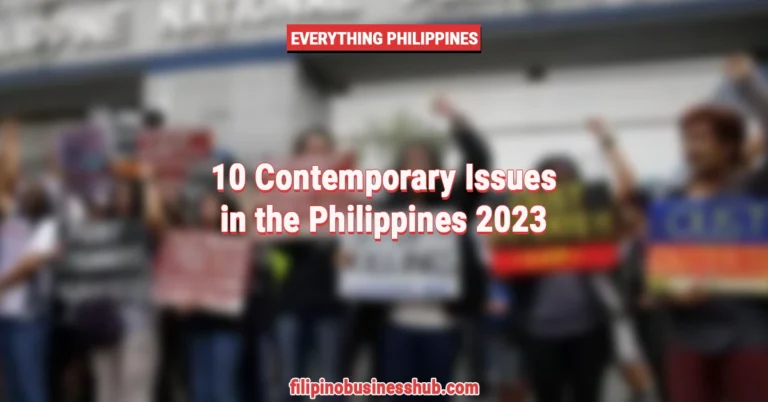The Top 7 Social Problems in the Philippines: A Comprehensive Overview
The Philippines is a country in Southeast Asia famous for its vibrant culture, stunning beaches, and warm hospitality. However, despite these attributes, it suffers from various social problems in the Philippines which impede progress and development – poverty, corruption, insufficient healthcare provision, and inadequate education are just some of the pressing concerns the Philippine society is currently grappling with.
Given the magnitude of these issues, it is crucial that they are discussed and resolved. This article offers an exhaustive analysis of the top social problems in the Philippines, along with their root causes and possible solutions. By drawing attention to them, we hope to raise awareness and foster collective action toward creating a fairer society here.
Table of Contents

Social Problems in the Philippines
Problem #1: Poverty and Inequality
In the Philippines, poverty and inequality continue to be significant social problems. According to the Philippine Statistics Authority (PSA), 23.7% of the population lived below the national poverty line in 2021. Furthermore, the proportion of the employed population below $1.90 purchasing power parity a day was 2.8%.
Philippine poverty and inequality stem from various factors, including limited job opportunities, inaccessible education, and healthcare services, and a lack of infrastructure development. All these contribute to creating an inequality gap which makes escaping poverty even harder for those already trapped within its grasp.
Poverty and inequality have lasting, devastating repercussions that affect nearly every aspect of our lives, ranging from malnutrition and poor health to limited access to education and child welfare issues. Children from poor backgrounds are at greater risk of dropping out and engaging in criminal activity than their more affluent counterparts; moreover, poverty-fuelled social unrest threatens national stability and economic development.
To address these problems, the Philippine government has implemented various initiatives and programs. These include the Conditional Cash Transfer (CCT) Program, Pantawid Pamilyang Pilipino (4Ps), and K-12 Education Program, among many others, aimed at alleviating poverty through cash grants, expanding education access and healthcare provision and encouraging inclusive economic growth – however much remains to be done to combat poverty and inequality entirely in this nation.
Overall, poverty and inequality remain major social problems in the Philippines and require collective action and sustainable strategies for eradication.
Problem #2: Corruption
Corruption is one of the significant social problems in the Philippines, defined as any instance in which power, position, or resources are misused for personal gain. Corruption manifests itself in various forms in the Philippines, such as bribery, nepotism, cronyism, and embezzlement – among many others. According to the Corruption Perceptions Index 2022 rankings (CPI), the Philippines ranks 116th out of 180 countries studied.
Corruption has far-reaching and harmful effects on society and the economy. It undermines the rule of law, reduces public trust in government institutions, discourages foreign investment, perpetuates poverty and inequality by diverting essential social services resources, and displaces resources to pay for illegal practices.
The Philippine government has undertaken various initiatives to combat corruption. One is the Anti-Red Tape Act, designed to cut bureaucratic red tape and streamline government services; another is its National Anti-Corruption Program of Action (NACPA) which details measures to increase transparency and accountability within public sectors. Furthermore, the Philippines ratified United Nations Convention Against Corruption (UNCAC), an agreement intended to foster international cooperation in fighting corruption.
Even with these efforts, corruption in the Philippines remains pervasive, especially within political and business circles. Unfortunately, due to inadequate enforcement mechanisms and political willpower constraints, progress in combatting corruption remains limited.
Problem #3: Education
The education system in the Philippines faces numerous difficulties and hurdles. Its hallmarks include inadequate resources, infrastructure issues, and low-quality instruction. According to US Agency for International Development 2021, at the outset of the pandemic, out-of-school youth increased from 16.9% in January 2020 to 25.2 % three months later in April 2020. In addition, the poor quality of education in this country has contributed to skills gaps that make it challenging for Filipino workers to compete in the global labor market.
Education is vital in solving social problems, as it enables individuals to acquire the knowledge and skills needed for economic and social mobility. Furthermore, education can address issues like poverty, inequality, and corruption through critical thinking classes, civic engagement, and responsible citizenship initiatives.
The Philippine government has taken numerous initiatives to bolster its education system. One such program is the K-12 program, which seeks to enhance primary education by giving additional years of schooling to students. Furthermore, investment has increased substantially in education, with one of the highest allocations from the national budget for this sector.
Even with these efforts, the Philippine education system still faces significant obstacles. Funding and infrastructure shortfalls and teacher shortages continue to impact quality education in the country, necessitating further reform and investment to boost quality learning environments and social development across the Philippines.
Problem #4: Health Care Inequalities
Philippine healthcare systems feature both public and private providers. Unfortunately, health inequalities continue to be an ongoing challenge in many parts of the country; primarily, rural and remote residents have limited access to essential services that may improve access.
Multiple factors, including poverty, lack of infrastructure, and insufficient funding, cause healthcare inequalities in the Philippines. Their effects are severe: many Filipinos suffer from preventable diseases and conditions. Furthermore, healthcare inequality contributes to social problems like poverty and inequality as families endure additional financial strain due to the high costs associated with medical treatment.
Efforts are currently being undertaken in the Philippines to address healthcare inequalities, with both government and private sectors taking steps to increase access to quality health services. Government programs designed to strengthen access include the Universal Health Care (UHC) Law which seeks to ensure all Filipinos have access to quality healthcare services; private companies have also contributed towards this effort by offering support and funding for health initiatives.
However, more work needs to be done in the Philippines to address healthcare inequalities. The government must allocate more resources and improve infrastructure in rural areas for essential healthcare services to be accessible to all. Furthermore, private sector involvement must increase to ensure sustainability and efficiency in health care delivery.
Problem #5: Substance Abuse
Substance abuse in the Philippines is a significant social problem, with many Filipinos succumbing to drug addiction and its related issues. Illegal drug use has long been a significant issue; more recently, synthetic drugs like methamphetamine have increased.
Substance abuse in the Philippines has various root causes, including poverty, lack of education, and peer pressure. In addition, substance addiction leads to severe physical and mental health problems and social, economic, and criminal consequences – putting lives in jeopardy in both physical and emotional terms.
Philippines’ efforts to combat substance abuse have been ongoing, with both government and non-government organizations developing programs aimed at preventing drug use and supporting those struggling with addiction. The Philippine government has initiated various campaigns against substance abuse – most prominently the “War on Drugs,” which has been widely criticized due to human rights abuses committed during its implementation.
Education can also play a vital role in combatting substance abuse. Schools and community organizations often offer programs to inform young people of the dangers of drug use and how it could pose risks that lead to addiction. By teaching young people about this danger early, substance abuse may be avoided before becoming an issue.
Substance abuse in the Philippines is an enormous social challenge that must be approached from multiple perspectives to be tackled successfully. Prevention efforts should focus on addressing root causes like poverty and poor education while offering treatment services and support to those struggling with addiction. By working collaboratively, governments, NGOs, and community organizations can make strides toward combatting substance abuse while creating a healthier, safer society for all Filipinos.
Problem #6: Violence Against Women and Children
Violence against women and children in the Philippines is a widespread social problem, with many Filipinos experiencing various forms of abuse and violence. The United Nations defines gender-based violence against women as any act that results in physical, sexual or psychological harm or suffering for women – including threats of such acts, coercion or arbitrary deprivation of liberty either taking place publicly or privately.”
Violence against women and children in the Philippines is alarming, with studies revealing that up to 1 in 4 females have experienced physical or sexual assault during their lifetime. Children also stand a high risk of violence – the Philippine National Police reports that 40% or more cases involve children as victims.
Violence against women and children has many causes, such as poverty, gender inequality, and cultural beliefs. However, the effects are devastating; victims can experience physical, emotional, and psychological trauma that has long-lasting repercussions.
As part of its efforts to address violence against women and children in the Philippines, both government agencies and non-government organizations have implemented programs to prevent violence against victims and provide aid for victims of domestic abuse. Furthermore, several laws have been enacted, such as the Anti-Violence Against Women and Children Act and the Magna Carta of Women, to provide women protection.
Non-governmental organizations play a critical role in combatting violence against women and children by providing support services for victims while raising awareness. Community-based programs, including education and awareness campaigns, also help combat this form of abuse.
Violence against women and children in the Philippines is an acute social problem that needs a robust response. By tackling its root causes like poverty and gender inequality, as well as providing services to victims, we can create a safer and more equitable society for all Filipinos.
Problem #7: Filipino Migrants and Overseas Workers
The Philippines is one of the largest exporters of labor worldwide, sending millions of Filipino migrants or overseas workers abroad as migrants or overseas workers. But unfortunately, they often face discrimination, abuse, and exploitation in their host countries.
Migration’s effects on Filipino families and society are multifaceted. While remittances from overseas workers contribute significantly to the nation’s economy, their absence may wreak havoc on family cohesion and relationships in communities around them.
Attempts at resolving issues facing Filipino migrants and overseas workers include:
- Government programs are designed to assist migrant workers and their families.
- Advocacy from non-government organizations.
- Assistance from non-profit groups.
Overall, the Philippines faces many complex social issues that require sustained and multidisciplinary efforts from all sectors of society to address them. However, by understanding these problems and working towards solutions jointly with all citizens of this nation, a more equitable and just society may emerge over time.
Role of the Government and Civil Society
As part of its solution to its social challenges, the Philippines needs the efforts of all segments of society – both government and civil society organizations alike.
Philippine government policies and programs address social issues like poverty, education reform, health care services provision, corruption, violence against women and children, and issues surrounding gender inequality. Examples of such efforts are the Pantawid Pamilyang Pilipino Program, K-12 education reform initiative, Universal Health Care Law, Anti-Red Tape Act, and Magna Carta of Women, among many others.
Implementation and effectiveness remain challenges to policies and programs; corruption, bureaucracy, and limited resources often obstruct their impact.
Civil society organizations play an essential role in combatting social problems in the Philippines. These grassroots-level organizations offer support and assistance to marginalized communities while lobbying for policy changes that foster justice and equality.
As long as collaboration and partnerships between government and civil society exist, it has a greater chance of effectively addressing social problems within the Philippines, creating a more just and equitable society for its inhabitants.
Also Read: 10 Contemporary Issues in the Philippines 2023
Conclusion
Philippines society is facing numerous social issues that need urgent and prompt solutions, including poverty and inequality, corruption, education inequities, health care inequalities, substance abuse issues related to women and children, and violence against Filipino migrants or overseas workers – these being among the significant problems afflicting individuals as well as impeding the progress of our nation as whole.
Government and civil society organizations must collaborate closely in tackling social problems effectively. While the Philippines government has implemented policies and programs to tackle them, more must be done for efficient implementation. Civil society organizations also play an integral role in supporting vulnerable communities.
As citizens of the Philippines, we all should help address social problems. Individual action may include:
- Supporting initiatives and programs designed to tackle them.
- Participating in advocacy campaigns.
- Raising awareness.
- Simply taking individual steps that address them directly.
Collective efforts will allow us to ensure a better future for ourselves and future generations.
We must recognize and address the top social problems in the Philippines. Now is the time for us all to join hands in creating an equitable, just, and prosperous society.






